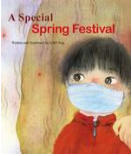—______. There is a new movie on show. Let's go.
—Someone's car was ______my way and I waited until it was moved away.
—She has a real ____for singing. Nobody taught her.
—________which one is best for you, first you must do some research.
—It must be Bob's, he is the most excellent student in our school.
—No way, this area is so full of your toys that they _______all the space.
—It's fantastic. It is a pity that I ________the beginning of it.
—Not until it ________next month.
—_________! I will miss you so much.
It was sunny last Friday. I arrived at the railway station at three in the afternoon. I would take the1to Shanghai to see my old friend Jack. But it was two hours2my train left. I thought it was the perfect time and place to look3an act of kindness to do.
Outside the station, there was a girl having4for sale. I told her that I'd like to buy flowers for someone else, and that she could5who she will give the flowers to. She looked a little puzzled(困惑的),6I suggested that perhaps she could give the flowers to someone who looked a little7.That was because the flowers might cheer him or her up.
"That's a crazy idea!" said the girl. But then I explained a little more about the idea of doing something for a8, and she understood.
"I'm leaving for Shanghai and then I'll9know how it turns out," I said. "But you will have a good10to make someone happy.11good deeds(善 举)we do, they always come back to us." At that time, she started to seem excited about it. She went to12the flowers out of the water, and I explained, "You'd better leave the flowers there until the person13."
At that time, I thought she was14surprised and happy, because it might be her first time to meet a customer like me. I15for the flowers, said goodbye, and walked into the station.
How wonderful the day was!
How to fight against COVID-19 (新冠病毒)? We choose some books to help you. The books were translated into 13 languages, including Japanese, French and Russian. They are convenient for readers to enjoy.
 |
Virus, Virus, You Cannot Scare Me! (Writer: Mu Xiangzhen) The book makes parents and children be able to learn—in a fun way—about how viruses (病毒) spread and what people can do to protect themselves. It tells children not to fear about viruses. Besides, it also introduces the idea of getting well with nature, and hopes children can protect wild life and the natural environment. |
 |
A Special Spring Festival (Writer: Gao Jing) This book pictures children's special Spring Festival in China during the outbreak of COVID-19. It tells a story of a common family in China. It tries to answer the child's question "Why can't I be allowed to play outside?" It tells the child what COVID-19 is, how it spreads, and how we can protect ourselves from it. The pictures show love between family members, friends and everyone. |
 |
Ten Tips to Fight Monsters (Writer: Dong Ruihan) Dad leaves 10 tips to help us fight the virus. Who will win the war? The story will gently teach children how to prevent the disease (疾病) in a language that they can easily understand. It will help kids remain calm in the hard time, and encourage them to help family members to prevent the disease. |
 |
A Brief History of Viruses for Children (Writer: Changsha White-flag Dolphin Children's Book Workshop) This story book tells the beginning of the virus, so the readers can understand the history of the virus easily. The book sets up a "Ten Questions about COVID-19" section, which explains the knowledge of COVID-19 (including how it spreads), helping children readers to understand the virus basing on (基于) reason and science. |
One day, our teacher said that he had an exercise for us to try. We were to stand, facing away from our classmates, and fall backward, relying(依赖)on another student to catch us. Most of us were uncomfortable with this. We couldn't fall back for more than a few inches before stopping ourselves.
Finally, Judy gave it a try. She is a thin, quiet, dark-haired girl who always wears big white sweaters. Judy crossed her arms over her chest, closed her eyes, leaned back, and did not stop. She looked like one of the TV ads where the model jumps into the pool.
For a moment, I was sure she was going to fall onto the floor. At the last moment, her partner grabbed her head and shoulders and pulled her up immediately.
"Whoa!" several students yelled. Some clapped their hands. Our teacher finally smiled." You see," he said to the girl." You closed your eyes. That was the difference. Sometimes you cannot believe what you see. You have to believe what you feel. And if you are ever going to have other person trust you, you must feel that you can trust them too even when you're in the dark. Even when you're falling.
Homework is a problem for students all over the world. As a student, you have lots of homework to do every day. It's a major part of a student's schooldays. It's the best way to review what you have learned in class. And it helps you understand important concepts(概念). Luckily, there are several things you can do to make homework less difficult.
Be sure you understand the homework
Write your homework down in your notebook if you need to. Don't be afraid to ask questions about it. It's much easier to ask the teacher during or after class than to try to remember later that night!
Use your time at school
Many schools have study hall. It is designed to allow students to study on their own. It's more interesting to play with friends. But the more homework you finish at school, the less you'll have to do that night.
Take a break
It's difficult to hold your attention for too long. So take some breaks while doing your homework. Sitting for too long without relaxing will make you feel very tired. Taking a 15-minute break every hour is a good idea for most people.
Make a plan
If you don't finish your homework at school, think about how much you have left, so you can budget your time. Most students have between 1hour and 3hours of homework a night. If it's a heavy homework day, you'll need to spend more time on it. It's a good idea to make a homework timetable, especially when you want to enjoy sports or other activities.
Children today would rather read, do housework or even do homework than play outside—and they get out half as much as their parents did when they were young.
According to a UK study, those growing up during the 1970s and 1980s enjoying more than two hours of outdoor activities each weekday, and nine hours on weekends—whatever the weather is. But their children play outside for just over one hour each weekday, and fewer than five hours on Saturdays and Sundays.
So, the UK started an activity to encourage children to give up 30 minutes of screen time a day to play outdoors.
The Wild Network, born on September 25, 2013, is joined by more than 300 organizations, large or small. It tries to attract children away from television and computer screen and into woods and parks.
It is the biggest ever activity to reconnect children with nature and outdoor activities, and it plans to help improve children's health.
Suggestions on how to get more time in nature including collecting fruits, camping, watching autumn color on trees and so on.
This is not the first time the message of less screen, more play has been brought up. Children in the 1980s were encouraged to do the same by BBC TV show Why Don't You, which encouraged children to "turn off your TV set, and go to dosomething less boring instead".
You can learn more about the activity by visiting http ://www.Project wild thing.com.
Two brothers decided to dig a deep hole behind their house. As they were working, a couple of older boys (stop) by to watch.
"What are you doing?" asked one of the (visit) curiously.
"We plan to (dig) a hole all the way through the earth!" One of the brothers said (excited).
The older boys began to laugh, telling the (young) ones that it was impossible.
After a long (silent), one of the diggers picked up box full of treasure, he showed the wonderful things the older boys.
Then he said confidently, "Even if we don't dig all the way through the earth, look at what we found along the way!"
(they) dream was far too big, but it did cause them to dig. And that is what a dream is for—to cause us to move in the direction we have chosen.
Not every dream will be realized, when you couldn't get what you wanted, perhaps you can say, "Yes, but look at the wonderful things that have come into my life because I tried to do something!"
请根据邮件内容,用英语写一封回信。
Dear Li Hua,
Here is good news for you!
Our English corner will be held at 3:00 this Sunday on the basketball field in our school. There will be a lot of interesting activities. A foreign teacher, Mr. David is glad to join us. I know you're interested in singing. Would you like to set aside some time for it? Could you bring your guitar? I wonder if you can come.
I'm looking forward to your reply.
Yours
Wang Qiang
Great! I'd like to.
Benefits:
1. Practice English
2. Make friends
3. ....
注意:
1)词数 90 左右,开头和结尾已经写好,不计入总词数;
2)可适当增加细节,以使行文连贯;
3)文中不得出现反映考生信息的真实人名、地名等内容。
参考词汇: 益处 benefit (n.)
Dear Wang Qiang,
That's great! I'm happy to receive your letter.
See you then!
Yours,
Li Hua